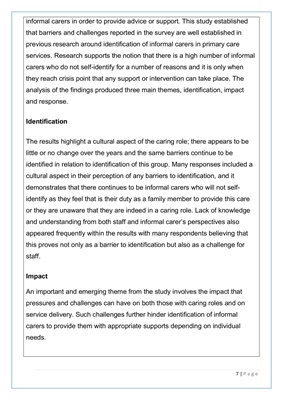
7 | P a g e
informal carers in order to provide advice or support. This study established
that barriers and challenges reported in the survey are well established in
previous research around identification of informal carers in primary care
services. Research supports the notion that there is a high number of informal
carers who do not self-identify for a number of reasons and it is only when
they reach crisis point that any support or intervention can take place. The
analysis of the findings produced three main themes, identification, impact
and response.
Identification
The results highlight a cultural aspect of the caring role; there appears to be
little or no change over the years and the same barriers continue to be
identified in relation to identification of this group. Many responses included a
cultural aspect in their perception of any barriers to identification, and it
demonstrates that there continues to be informal carers who will not selfidentify
as they feel that is their duty as a family member to provide this care
or they are unaware that they are indeed in a caring role. Lack of knowledge
and understanding from both staff and informal carer's perspectives also
appeared frequently within the results with many respondents believing that
this proves not only as a barrier to identification but also as a challenge for
staff.
Impact
An important and emerging theme from the study involves the impact that
pressures and challenges can have on both those with caring roles and on
service delivery. Such challenges further hinder identification of informal
carers to provide them with appropriate supports depending on individual
needs.